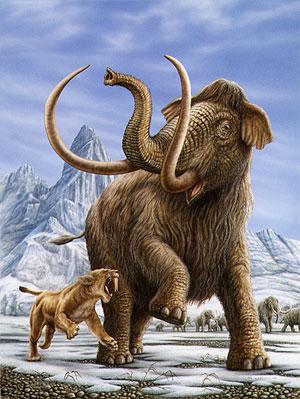In five to six years, mammoths may return to the animal kingdom.
Scientists in Japan were able to obtain preserved mammoth DNA from a research lab in Russia and are planning to use the DNA to clone a mammoth, according to the Daily Yomiuri. A team has been formed with scientists from the U.S., Russia and Japan.
“Preparations to realize this goal have been made,” Lead Researcher and Professor at Kyoto University Akira Iritani said to the Daily Yomiuri.
A team at the Riken Center for Developmental Biology in Kobe, Japan was able to successfully clone mouse DNA that had been frozen for 16 years. This was the first achievement in this area of biology. Iritani has taken this research and is now building upon it for his own.
This study began in 1997 but the three previous attempts to clone were unsuccessful because the DNA was too degraded.
“The highly degraded quality of DNA that has previously been isolated for cloning attempts of the wooly mammoth would be incapable of accurately directing the full development of a living organism,” Senior Biology Major Kimberly Heck said.
Last summer Iritani was able to extract a usable DNA sample and now the team plans to remove the nuclei of the mammoth cells to fertilize an African elephant’s egg cell of which the nuclei will have already been removed. If the embryo survives this process the scientists will then impregnate an elephant with the mammoth egg in the hopes that a mammoth will be born, according to CNN.com.
“What are their goals with this project? Curiosity, a desire for knowledge, or simply doing it to see if it can be done,” Visiting Assistant Professor of Philosophy Joe Cole said. “Just because they have the power to do something does not mean they are justified in doing it.
“There are too many potential negative consequences on the environment and on the animals involved,” Cole said.
Heck believes that the environmental and ecological changes that have taken place over the last 10,000 years make the chances of a mammoth surviving, very low.
“While the reasons stated for attempting to clone these organisms is so that we may gain a better understanding of them, this lack of understanding is precisely what makes such cloning efforts a bad idea,” Heck said.
The current cloning team has been compiled of different types of scientists for their expertise in specific fields of study, in order to be as prepared as possible.
The team has invited Professor Minoru Miyashita of Kinki University to join the project. Miyashita used to be the head of Tennoji Zoo in Osaka, Japan and has asked for zoos all over the nation to give elephant egg cells in the event of a female elephant death.
In addition to Miyashita the head of the Russian mammoth research laboratory, and two U.S. researchers specializing in African elephants have been invited to help, according to the Daily Yomiuri.
The U.S. researchers are experts concerning animal in vitro fertilization and are responsible for putting the mammoth embryo into the elephant.
“If a cloned embryo can be created, we need to discuss, before transplanting it into the womb, how to breed [the mammoth] and whether to display it to the public,” Iritani said to the Daily Yomiuri. “After the mammoth is born, we’ll examine its ecology and genes to study why the species became extinct and other factors.”

